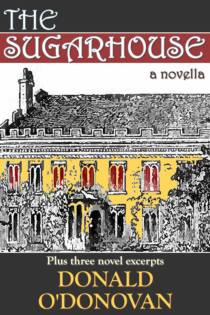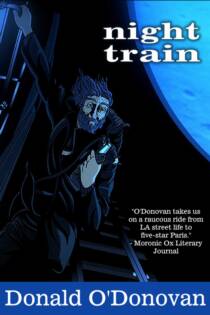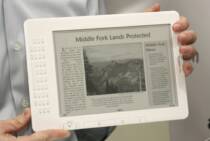Short Story
"Penny Candy"
Rebecca Fiske
© 2010 Moronic Ox Literary Journal - Escape Media Publishers / Open Books
Moronic Ox Literary and Cultural Journal - Escape Media Publishers / Open Books Advertise your book, CD, or cause in the 'Ox'
Novel Excerpts, Short Stories, Poetry, Multimedia, Current Affairs, Book Reviews, Photo Essays, Visual Arts Submissions
Danny Meyer's store was twenty-seven concrete sidewalk squares from my house on Grove Street in Rutland, Vermont. He had the best penny candy display case in town, and every summer day, right after I’d finished watching Fury on TV, I would go there and spend the fifteen cents that dad dropped into the crystal ashtray on the kitchen counter each morning before he left for work. Danny owned the store. On Saturdays, the Jewish Sabbath, the Meyers would walk together down those twenty-seven squares, then down eighteen squares more, until they got to the synagogue on the corner across from the Rutland High School Gym. Of course he closed the store on Saturdays, so I had to wait until Monday to get my Sweet-tarts, Chocolate Babies, Cherry Stones, Bazooka, Tootsie pops, and caramel rolls.
 Sunday, dad stayed home. We went to church, and then, afterwards, we ate roast beef or game hen, turkey or goose, mashed potatoes or yams, brown gravy, green peas in cream, white dinner rolls, and star-butter. We drank milk, or sometimes seven-up. After the dishes were washed, I cuddled in dad's arms, and he read the funnies aloud until he dozed off a bit. There was nothing better than that: listening to his breathing, in and out, deep and clear, smelling his chainsaw and pine pitch, watching his gray chest beat with the rhythm of his heart, sometimes fast, sometimes slow.
Sunday, dad stayed home. We went to church, and then, afterwards, we ate roast beef or game hen, turkey or goose, mashed potatoes or yams, brown gravy, green peas in cream, white dinner rolls, and star-butter. We drank milk, or sometimes seven-up. After the dishes were washed, I cuddled in dad's arms, and he read the funnies aloud until he dozed off a bit. There was nothing better than that: listening to his breathing, in and out, deep and clear, smelling his chainsaw and pine pitch, watching his gray chest beat with the rhythm of his heart, sometimes fast, sometimes slow.
 Once, when dad was on a drunk, we missed Sunday from November until June, but usually it didn't take that long. It was just that in wintertime the Arctic air blew cold. It came down from Canada - down over the northeast kingdom, over Middlebury and across Chittenden swamp, right into our bones. Dad always felt it first, and I could smell it on his breath, that biting ice at the back of his throat. He'd stoke the furnace in the cellar, maybe split some wood, and come back a little more liquored-up. Even before the first frost cut hoary scratches in the backyard puddles and rotted the last of the yellow squash; even before the dying leaves gave up their screaming and burning, falling silent; even before the chestnuts and black walnuts shed their spiky balls and the rodents went to work; even before all that, dad knew.
Once, when dad was on a drunk, we missed Sunday from November until June, but usually it didn't take that long. It was just that in wintertime the Arctic air blew cold. It came down from Canada - down over the northeast kingdom, over Middlebury and across Chittenden swamp, right into our bones. Dad always felt it first, and I could smell it on his breath, that biting ice at the back of his throat. He'd stoke the furnace in the cellar, maybe split some wood, and come back a little more liquored-up. Even before the first frost cut hoary scratches in the backyard puddles and rotted the last of the yellow squash; even before the dying leaves gave up their screaming and burning, falling silent; even before the chestnuts and black walnuts shed their spiky balls and the rodents went to work; even before all that, dad knew.
 And what did Danny Meyers care if the snow was coming? What did it matter as long as the storm windows were fixed and the furnace filled with oil, as long as the delivery trucks still arrived and the walk was shoveled? His world of selling never changed. His Saturdays stretched from month to month, year to year. His penny candy waited for me in the display case.
And what did Danny Meyers care if the snow was coming? What did it matter as long as the storm windows were fixed and the furnace filled with oil, as long as the delivery trucks still arrived and the walk was shoveled? His world of selling never changed. His Saturdays stretched from month to month, year to year. His penny candy waited for me in the display case.
 Black walnut was the best wood, the richest wood to use for carpentry, the darkest, sturdiest wood for cabinets or tables, dressers or cupboards. Way past the store, way past the golf course, way past the sawmill even, there was an old grove of black walnut trees that somebody had planted more than a hundred years ago. They're there still, and nobody really knows the walnut trees' true worth. Anyway, the Meyers’ candy case was made from black walnut, carved and chiseled, deeply oiled and shiny. The front was made of glass, so each type of candy was artfully displayed.
Black walnut was the best wood, the richest wood to use for carpentry, the darkest, sturdiest wood for cabinets or tables, dressers or cupboards. Way past the store, way past the golf course, way past the sawmill even, there was an old grove of black walnut trees that somebody had planted more than a hundred years ago. They're there still, and nobody really knows the walnut trees' true worth. Anyway, the Meyers’ candy case was made from black walnut, carved and chiseled, deeply oiled and shiny. The front was made of glass, so each type of candy was artfully displayed.
 Chocolate Babies were soft and chewy. I sometimes chose nine of the best, carefully looking for round, smooth big heads and intact arms and legs. Three cents worth, one fifth of my total, was a lot, but I loved the way they fit at the bottom of the candy bag, ready to be covered with six Cherrystones, two cents, five caramel rolls, five cents more, three Tootsie Rolls and two Bazookas. What secret riches I had then, and it helped so to walk home without opening the paper bag, without eating a single piece, denying myself until... I thought of each layer, bottom to top: one, two, three, four, five, and six. I imagined the moment when I would reach my house and go up the stairs to my bedroom. There, I would quietly close the door and sit on my bed to play my game of fate. First I would say a prayer "Oh God, please tell me my future." Next, I would open the candy bag and dump the contents onto my blanket. The Chocolate Babies always landed in the middle, in strange and unpredictable patterns, and the rest of the candies lay here or there, like uprooted trees, fallen stars and toppled buildings. Whatever the catastrophe, however chaotic the scene, I would fix it, placing the trees upright, re-constellating the sky, repairing the buildings, calming the babies. Once all was well, I'd begin to taste the world, saying, "we don't really need so many trees; one less baby won't hurt..." until I swallowed everything and said Amen. I don't know why, but always after Amen, I smelled the smell of my mother, and I thought of her lying on her bed just down the hall, dressed in her green silk robe, resting.
Chocolate Babies were soft and chewy. I sometimes chose nine of the best, carefully looking for round, smooth big heads and intact arms and legs. Three cents worth, one fifth of my total, was a lot, but I loved the way they fit at the bottom of the candy bag, ready to be covered with six Cherrystones, two cents, five caramel rolls, five cents more, three Tootsie Rolls and two Bazookas. What secret riches I had then, and it helped so to walk home without opening the paper bag, without eating a single piece, denying myself until... I thought of each layer, bottom to top: one, two, three, four, five, and six. I imagined the moment when I would reach my house and go up the stairs to my bedroom. There, I would quietly close the door and sit on my bed to play my game of fate. First I would say a prayer "Oh God, please tell me my future." Next, I would open the candy bag and dump the contents onto my blanket. The Chocolate Babies always landed in the middle, in strange and unpredictable patterns, and the rest of the candies lay here or there, like uprooted trees, fallen stars and toppled buildings. Whatever the catastrophe, however chaotic the scene, I would fix it, placing the trees upright, re-constellating the sky, repairing the buildings, calming the babies. Once all was well, I'd begin to taste the world, saying, "we don't really need so many trees; one less baby won't hurt..." until I swallowed everything and said Amen. I don't know why, but always after Amen, I smelled the smell of my mother, and I thought of her lying on her bed just down the hall, dressed in her green silk robe, resting.
 But of course she was not really there. And I would become angry at my imagination for forgetting that she was dead. Before she was dead, she was crazy. I knew the danger of letting ones mind wander. But I couldn't help it. I thought of everything I could remember about her, beginning with her body. The last time I saw her was August 14, 1965, when I was nine and she was forty-nine. It was the day before she went to the hospital to die. As she lay in her bed, I sang her songs that I’d made up, songs about angels and cowboys and heather and rose petals. Singing, then humming, I stroked her forehead over and over again. Her light brown hair was brushed back from her face, and her skin was warm and so, so soft. Her eyes frightened me once, though, because they rolled back in her head. When I told her about it, she said I must have imagined it because she was fine. She wasn't fine.
But of course she was not really there. And I would become angry at my imagination for forgetting that she was dead. Before she was dead, she was crazy. I knew the danger of letting ones mind wander. But I couldn't help it. I thought of everything I could remember about her, beginning with her body. The last time I saw her was August 14, 1965, when I was nine and she was forty-nine. It was the day before she went to the hospital to die. As she lay in her bed, I sang her songs that I’d made up, songs about angels and cowboys and heather and rose petals. Singing, then humming, I stroked her forehead over and over again. Her light brown hair was brushed back from her face, and her skin was warm and so, so soft. Her eyes frightened me once, though, because they rolled back in her head. When I told her about it, she said I must have imagined it because she was fine. She wasn't fine.
 What was her smell: musk, lilac, ocean? Honey, salt, oranges? She wore three rings, a diamond, a gold band, and an amethyst. She played the piano for me. Sometimes I would beg her to play "Autumn Leaves" just to watch her fingers dance across the keyboard and her hands cross and flourish. By the time I was four I didn't trust her, perhaps because she told me that the telephones were tapped, or because she insisted that we had to hide all of the clocks. I adored her anyway. Only I whispered inside my mind, "Can this be real? Can she be right?" She painted portraits, big oil paintings of herself, of her great aunt, of strangers. They hung in the dining room and living room.
What was her smell: musk, lilac, ocean? Honey, salt, oranges? She wore three rings, a diamond, a gold band, and an amethyst. She played the piano for me. Sometimes I would beg her to play "Autumn Leaves" just to watch her fingers dance across the keyboard and her hands cross and flourish. By the time I was four I didn't trust her, perhaps because she told me that the telephones were tapped, or because she insisted that we had to hide all of the clocks. I adored her anyway. Only I whispered inside my mind, "Can this be real? Can she be right?" She painted portraits, big oil paintings of herself, of her great aunt, of strangers. They hung in the dining room and living room.
 When the phone rang the night she died, my father answered it in the living room, as he sat in the easy chair beneath her self-portrait. She looked down at us, her hazel eyes fixed; her sweet lips pursed; her crimson smock buttoned. He said "hello" and then was silent. His whole body stiffened and he began to sob. I watched for just a second and then ran upstairs and hid inside my closet, closing the door behind me. I knew she was gone, but I prayed anyway, on my knees, that he was crying because the hospital was too expensive. After a while my sisters knocked on the closet door and told me to come out. They were crying as well; I came out and told them to stop. I felt disgusted, filled with hate. I went to my jewelry box, took out a ring my mother had given me and brought it to my father. He was shaking, rocking back and forth, but he put it on his little finger and thanked me. I looked up at her painting. She looked blindly back. No!
When the phone rang the night she died, my father answered it in the living room, as he sat in the easy chair beneath her self-portrait. She looked down at us, her hazel eyes fixed; her sweet lips pursed; her crimson smock buttoned. He said "hello" and then was silent. His whole body stiffened and he began to sob. I watched for just a second and then ran upstairs and hid inside my closet, closing the door behind me. I knew she was gone, but I prayed anyway, on my knees, that he was crying because the hospital was too expensive. After a while my sisters knocked on the closet door and told me to come out. They were crying as well; I came out and told them to stop. I felt disgusted, filled with hate. I went to my jewelry box, took out a ring my mother had given me and brought it to my father. He was shaking, rocking back and forth, but he put it on his little finger and thanked me. I looked up at her painting. She looked blindly back. No!
 No was all that I could feel; no mother, no anything anymore. The priest came. He brought communion wafers and holy wine. Relatives brought food. No! At her funeral her casket was shiny, but not walnut, I think. Perhaps it was oak; I’m not sure. Pallbearers must have carried her down the aisle of the church. I only remember her casket floating past me. I rode in a limousine next to my relatives, old people, and when I said that I didn't know them, they told me, "Hush now.”
No was all that I could feel; no mother, no anything anymore. The priest came. He brought communion wafers and holy wine. Relatives brought food. No! At her funeral her casket was shiny, but not walnut, I think. Perhaps it was oak; I’m not sure. Pallbearers must have carried her down the aisle of the church. I only remember her casket floating past me. I rode in a limousine next to my relatives, old people, and when I said that I didn't know them, they told me, "Hush now.”
 In the days that followed her funeral I spent a lot of time alone in the house, shuffling through her dresser drawers, reading her scrapbooks, looking at her photo albums. I tried to play her piano, but I failed. I tried to sing her angel cowboy heather rose petal song, but I failed. I tried to wait for a sign from the heavens. Nothing helped. Nothing. The summer turned to autumn; the autumn turned gray and bare. I was always cold, and I knew I was dirty, neglecting my duties, losing my way. I knew that people were watching me, shaking their heads and thinking, "Poor little thing."
In the days that followed her funeral I spent a lot of time alone in the house, shuffling through her dresser drawers, reading her scrapbooks, looking at her photo albums. I tried to play her piano, but I failed. I tried to sing her angel cowboy heather rose petal song, but I failed. I tried to wait for a sign from the heavens. Nothing helped. Nothing. The summer turned to autumn; the autumn turned gray and bare. I was always cold, and I knew I was dirty, neglecting my duties, losing my way. I knew that people were watching me, shaking their heads and thinking, "Poor little thing."
 One morning, during silent reading time, Miss Millet, my teacher, asked if she could brush my hair. She called me to her desk, sat me at her side, and brushed and brushed, leaving me with a tight little braid. I burned with shame, but I smiled and sat ever so still. Another day, near Christmas, I felt the sting of the nurse's rubbing alcohol on my split lip after I fell on the driveway. Before that I’d only known my mother holding me on her lap, rocking, rocking, and saying, "There, there my love, cry all you like and then I'll fix it."
One morning, during silent reading time, Miss Millet, my teacher, asked if she could brush my hair. She called me to her desk, sat me at her side, and brushed and brushed, leaving me with a tight little braid. I burned with shame, but I smiled and sat ever so still. Another day, near Christmas, I felt the sting of the nurse's rubbing alcohol on my split lip after I fell on the driveway. Before that I’d only known my mother holding me on her lap, rocking, rocking, and saying, "There, there my love, cry all you like and then I'll fix it."
 By New Years Day I began to understand my father's “hibernation”. He said he was like an old bear that just needed to crawl into his cave for the winter. He only frightened me once, really, and looking back, I know there was nothing to fear. He’d stayed out all day on New Year’s Eve, and all New Year’s Day as well, and I had waited, waited for him, certain that he too was dead. Then, about six o’clock that night, he came walking in through the front door. His face was bloodied and grizzled. His red plaid wool shirt was un-tucked. He staggered like a drunk. I ran from him, perhaps because I was ashamed, perhaps because I was enraged, perhaps because I was alone. As I hid beneath my bed, I heard him walk into the kitchen, open the cellar door, and then – horribly – fall down the stairs. I prayed, and he was fine. The next morning, in fact for the rest of the winter, he drank vodka, slept, and healed from his broken ribs and bruised face. I went to school, turned ten, and began taking better care to ease the worries of others.
By New Years Day I began to understand my father's “hibernation”. He said he was like an old bear that just needed to crawl into his cave for the winter. He only frightened me once, really, and looking back, I know there was nothing to fear. He’d stayed out all day on New Year’s Eve, and all New Year’s Day as well, and I had waited, waited for him, certain that he too was dead. Then, about six o’clock that night, he came walking in through the front door. His face was bloodied and grizzled. His red plaid wool shirt was un-tucked. He staggered like a drunk. I ran from him, perhaps because I was ashamed, perhaps because I was enraged, perhaps because I was alone. As I hid beneath my bed, I heard him walk into the kitchen, open the cellar door, and then – horribly – fall down the stairs. I prayed, and he was fine. The next morning, in fact for the rest of the winter, he drank vodka, slept, and healed from his broken ribs and bruised face. I went to school, turned ten, and began taking better care to ease the worries of others.
 As spring came, and the warm Gulf Stream blew over us, he too began to stir. I learned later to love those first signs of my father's reawakening, but at the time I only watched him. He shaved his beard, washed his clothes, and discarded too many empty vodka bottles. He bought 7-Up. He called his friend Garth to come stay with us, and then shut himself in his bedroom for two weeks. I was too young then to understand the detoxification process, but now I know that he must have been in agony. He must have sweated, shivered, cursed, cried and raged. Still, it brought my father back to life, brought him back to me. By Palm Sunday we went to church again, and I felt a surge of hope as the choir sang "Hail thee festival day" and the priest shook his hand and welcomed him back. I felt the pride of having him beside me, strong, handsome, forgiven…
As spring came, and the warm Gulf Stream blew over us, he too began to stir. I learned later to love those first signs of my father's reawakening, but at the time I only watched him. He shaved his beard, washed his clothes, and discarded too many empty vodka bottles. He bought 7-Up. He called his friend Garth to come stay with us, and then shut himself in his bedroom for two weeks. I was too young then to understand the detoxification process, but now I know that he must have been in agony. He must have sweated, shivered, cursed, cried and raged. Still, it brought my father back to life, brought him back to me. By Palm Sunday we went to church again, and I felt a surge of hope as the choir sang "Hail thee festival day" and the priest shook his hand and welcomed him back. I felt the pride of having him beside me, strong, handsome, forgiven…
 Each Easter Sunday, the Morgan Horse Farm opened, and the trainers let the mares and foals run free in the front pasture for visitors to watch. The foals were only weeks old, and they cavorted on spindly legs. Sometimes, they'd walk up to me and let me pet their soft black noses. That particular Easter, I fell in love with one: the raffle colt. I bought three raffle tickets, hoping this would be the year I'd win, and as my father and I drove home, I told him about my plans. The garage would be his stable; the field behind our house, Miss Miner's field, would be his pasture. I would love him, train him, ride him to school each day. I talked on and on, forgetting myself, forgetting my father, forgetting Sunday's sermon, and forgetting Monday's homework too.
Each Easter Sunday, the Morgan Horse Farm opened, and the trainers let the mares and foals run free in the front pasture for visitors to watch. The foals were only weeks old, and they cavorted on spindly legs. Sometimes, they'd walk up to me and let me pet their soft black noses. That particular Easter, I fell in love with one: the raffle colt. I bought three raffle tickets, hoping this would be the year I'd win, and as my father and I drove home, I told him about my plans. The garage would be his stable; the field behind our house, Miss Miner's field, would be his pasture. I would love him, train him, ride him to school each day. I talked on and on, forgetting myself, forgetting my father, forgetting Sunday's sermon, and forgetting Monday's homework too.
 My father was a steeplejack, a rare thing in Vermont during the sixties. Each steeple painted meant buying gallons of white high-gloss paint, rigging ropes, swinging on his boatswain's chair high above the ground, telling funny stories about worried widow spectators, and it meant making thousands of dollars. It meant glory. Once, he got his picture in the Addison Independent.
My father was a steeplejack, a rare thing in Vermont during the sixties. Each steeple painted meant buying gallons of white high-gloss paint, rigging ropes, swinging on his boatswain's chair high above the ground, telling funny stories about worried widow spectators, and it meant making thousands of dollars. It meant glory. Once, he got his picture in the Addison Independent.
 On Sundays we'd take a picnic: steak, corn (once August came, since cornstalks were only knee high by the Fourth of July) soda, bread & butter. Usually, we'd hike up Snake Mountain, up the Red Sand Rock range to the secret place where we had a grill and two benches made from a fallen Aspen. I knew the Hermit Thrush, the Rose Breasted Grosbeak, the Scarlet Tanager, the White Throated Sparrow. I knew the deer trails. I knew the seashell fossils made long ago, when the mountains were undersea, somehow…
On Sundays we'd take a picnic: steak, corn (once August came, since cornstalks were only knee high by the Fourth of July) soda, bread & butter. Usually, we'd hike up Snake Mountain, up the Red Sand Rock range to the secret place where we had a grill and two benches made from a fallen Aspen. I knew the Hermit Thrush, the Rose Breasted Grosbeak, the Scarlet Tanager, the White Throated Sparrow. I knew the deer trails. I knew the seashell fossils made long ago, when the mountains were undersea, somehow…
 Then, after eating and hiking, we'd go to the old house in Quaker Village. To get there, we'd have to drive past the cemetery where mama was buried. I'd close my eyes or pretend we were elsewhere. My father always made the sign of the cross.
Then, after eating and hiking, we'd go to the old house in Quaker Village. To get there, we'd have to drive past the cemetery where mama was buried. I'd close my eyes or pretend we were elsewhere. My father always made the sign of the cross.
 Next, we'd go over the twin bridges that spanned the dam. Sometimes, if it was getting late, the floodgates were open, and we'd stop to watch the water rush past. Otter Creek was polluted, dad would always warn, and we could never eat the pike or trout, even if we could catch them. The old house was on the corner. No one lived there, and no one had since my father moved out in 1949. Still, he kept it up. When the town boys would break the windows, he'd replace them. When the slate fell from the roof, he'd set it again. When the foundation sagged, he shored it up. Izzy Mitchell kept the lawn mowed. The peonies, lily-of-the-valley, wild roses and lilac grew unfettered. Every summer Sunday, we checked the place, first walking the land, and then entering by the side door.
Next, we'd go over the twin bridges that spanned the dam. Sometimes, if it was getting late, the floodgates were open, and we'd stop to watch the water rush past. Otter Creek was polluted, dad would always warn, and we could never eat the pike or trout, even if we could catch them. The old house was on the corner. No one lived there, and no one had since my father moved out in 1949. Still, he kept it up. When the town boys would break the windows, he'd replace them. When the slate fell from the roof, he'd set it again. When the foundation sagged, he shored it up. Izzy Mitchell kept the lawn mowed. The peonies, lily-of-the-valley, wild roses and lilac grew unfettered. Every summer Sunday, we checked the place, first walking the land, and then entering by the side door.
 The old house was built in 1837, when Quaker Village was thriving. Downstairs was a parlor, a living room, a huge front room, a pantry, a dining room, and a kitchen with a hand pump and a rusted iron sink. There was no electricity and no bathroom. The stairs were long and very narrow, but they led to five bedrooms, and a main sitting room with a stone fireplace. I often wondered why the fireplace was upstairs, but I never asked. The attic door was latched shut, just as the cellar door was. Both, I suspect, held back the bats and mice. The only furniture was a torn leather Victorian rocker and a twin mattress. My favorite room was my mother's studio, where my father had stored her oil paints, her easel, her half-done paintings, and her discarded antique frames. He also put her clothing and personal things in that room, inside the closet. Some workdays, when he grew tired, he would nap there, in her studio, before driving the fifty miles south on Route #7, home to Rutland.
The old house was built in 1837, when Quaker Village was thriving. Downstairs was a parlor, a living room, a huge front room, a pantry, a dining room, and a kitchen with a hand pump and a rusted iron sink. There was no electricity and no bathroom. The stairs were long and very narrow, but they led to five bedrooms, and a main sitting room with a stone fireplace. I often wondered why the fireplace was upstairs, but I never asked. The attic door was latched shut, just as the cellar door was. Both, I suspect, held back the bats and mice. The only furniture was a torn leather Victorian rocker and a twin mattress. My favorite room was my mother's studio, where my father had stored her oil paints, her easel, her half-done paintings, and her discarded antique frames. He also put her clothing and personal things in that room, inside the closet. Some workdays, when he grew tired, he would nap there, in her studio, before driving the fifty miles south on Route #7, home to Rutland.
 Sundays, he napped and I wandered down to the creek or over the bridge to the dam. I tried not to remember the summer that everything fell silent. I tried not to remember Rutland, where the hallways no longer smelled of mother’s scent. But it never really worked. Sundays, when we took our time, he napped, and I wandered until I lost my way. I lay down then, letting the bank of Otter Creek enfold me; letting the sun set; letting the day fall to shadows; letting the shadows lift me; letting the trees uproot me; letting the stars fall; letting the buildings topple; letting there be one less baby, one less girl alone. That summer, I stopped buying penny candy at Dannny Meyer’s store.
Sundays, he napped and I wandered down to the creek or over the bridge to the dam. I tried not to remember the summer that everything fell silent. I tried not to remember Rutland, where the hallways no longer smelled of mother’s scent. But it never really worked. Sundays, when we took our time, he napped, and I wandered until I lost my way. I lay down then, letting the bank of Otter Creek enfold me; letting the sun set; letting the day fall to shadows; letting the shadows lift me; letting the trees uproot me; letting the stars fall; letting the buildings topple; letting there be one less baby, one less girl alone. That summer, I stopped buying penny candy at Dannny Meyer’s store.
Now You Can
Follow Moronic Ox
everyday on
used to be homeless
on the streets of LA.
O'Donovan wrote
the frist draft of
on 23 yellow legal pads...
Available in mobi format for your Kindle & in ePub format for your Sony Reader, Nook, Kobo Reader, iPad & other devices.
About the author:
Rebecca Fiske lives in the Berkshires of Massachusetts with her husband and daughter. She grew up in Vermont, and earned degrees from Bennington College, Smith College, and the University of New York at Albany. Her dissertation is titled Walter Benjamin: Marxist Rabbi with Dialectical Reservations.
She teaches religion and literature, literary theory and writing at Bard College at Simon’s Rock. Recently, her short story “August Genesis” was included in the anthology Experiencing Race, Class and Gender in the United States, published by MaGraw-Hill and her creative non-fiction piece “After the Aftermath” was accepted for publication in the next issue of The Rougarou Literary Journal. She has contributed a chapter “Generations Y and Z Meet the Alpha and Omega” to the forthcoming book Educating Outside The Lines, published by Peter Lang. In October, she will give a paper titled “The Language of Angels: Sacred Signification and the Crisis of Truth” at the Literature and Belief 2010 conference at Brigham Young University.
And watch for
O'Donovan's
new novella
to be published in
August, 2010
Don't You Think
It's About Time
You Made A Choice?
Click on the images below to learn about the various
e-readers available










